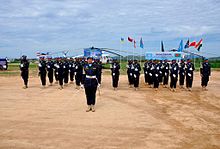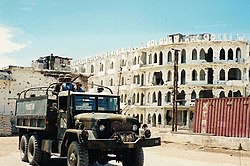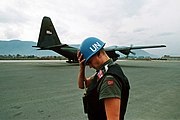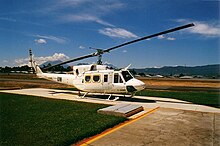United Nations peacekeeping
[2] It is distinguished from peacebuilding, peacemaking, and peace enforcement although the United Nations does acknowledge that all activities are "mutually reinforcing" and that overlap between them is frequent in practice.In cases where direct UN involvement is not considered appropriate or feasible, the Council authorizes regional organizations such as NATO,[4] the Economic Community of West African States, or coalitions of willing countries to perform peacekeeping or peace-enforcement tasks.DPKO's highest level doctrine document, entitled "United Nations Peacekeeping Operations: Principles and Guidelines" was issued in 2008.[5] Once a peace treaty has been negotiated, the parties involved might ask the United Nations for a peacekeeping force to supervise various elements of the agreed upon plan.When all agreements have been completed, the required personnel are assembled, and final approval has been given by the Security Council, the peacekeepers are deployed to the region in question.Pearson had initially suggested that the force consist of mainly Canadian peacekeepers, but the Egyptians were suspicious of having a Commonwealth nation defend them against the United Kingdom and its allies.The press release stated that the forces "represent the manifest will of the community of nations" and have "made a decisive contribution" to the resolution of conflict around the world.In a new spirit of cooperation, the Security Council established larger and more complex UN peacekeeping missions, often to help implement comprehensive peace agreements between belligerents in intra-State conflicts and civil wars.In this matter, the protection of a country's cultural heritage was included in the mandate of a United Nations mission (Resolution 2100) for the first time in history.In addition to many other advances, Italy signed an agreement with UNESCO in February 2016 to create the world's first emergency task force for culture, composed of civilian experts and the Italian Carabinieri.[32] Gender stereotypes and discrimination often limit women's opportunities for advancement and leadership roles within international organizations and military institutions.[34] The inclusion of women in peacekeeping operations provides access to places and people inaccessible to men and improves communication quality with civilian communities.[36][37][38][39] Women peacekeepers have been instrumental in addressing issues such as sexual violence, human trafficking, and gender-based discrimination, which are prevalent in conflict-affected areas.As of June 2022, 120 countries were contributing a total of 74,892 personnel in Peacekeeping Operations, with Bangladesh leading the tally (6,700), followed by India (5,832), Nepal (5,794), Rwanda (5,283) and Pakistan (4,399).[55] There is also evidence that the promise to deploy peacekeepers can help international organizations in bringing combatants to negotiate and increase the likelihood that they will agree to a cease-fire.[60] Political scientists Hanne Fjelde, Lisa Hultman and Desiree Nilsson of Uppsala University studied twenty years of data on peacekeeping missions, including in Lebanon, the Democratic Republic of the Congo, and the Central African Republic, and concluded that they were more effective at reducing civilian casualties than counterterrorism operations by nation states.The study also found that "the relationship is stronger for civilian than uniformed personnel, and is strongest when UN missions engage host states in the process of reform".[62] Likewise, Georgetown University professor Lise Howard argues that UN peacekeeping operations are more effective by virtue of their lack of compelling force; rather, their use of nonviolent methods such as "verbal persuasion, financial inducements and coercion short of offensive military force, including surveillance and arrest" are likelier to pacify warring parties.[63] A 2021 study in the American Journal of Political Science found that UN peacekeeping in South Sudan had a positive effect on the local economy."[67] The following table chart illustrates confirmed accounts of crimes and human rights violations committed by United Nations soldiers, peacekeepers, and employees.2008 capstone doctrine entitled "United Nations Peacekeeping Operations: Principles and Guidelines"[5] incorporates and builds on the Brahimi analysis.Whereas the new entity serves as a key enabler by co-ordinating the administration and logistics in UN peacekeeping operations, DPKO concentrates on policy planning and providing strategic directions.









António GuterresJean-Pierre LacroixBudgetUnited Nations peacekeeping missionsUnited Nations SystemUnited Nations SecretariatUnited Nations Security CouncilUnited Nations General AssemblyInternational Court of JusticeUnited Nations Economic and Social CouncilUnited Nations Trusteeship CouncilDepartment of Peace Operationspeacebuildingpeacemakingpeace enforcementUnited NationsPeacekeeperspeace agreementsberetsChapter VII of the United Nations Chartercollective actionEconomic Community of West African StatesGuard of HonorDemocratic Republic of the CongoBangladesh UN Peacekeeping ForceBastille Day military paradeDepartment of Peacekeeping OperationsRoméo DallaireRwandan genocideShake Hands With the DevilRules of EngagementEast Timorcollective responsibilityDecisionsUnited StatesGermanyFranceUnited KingdomRussiaCanadaworld military expendituresthe Ivory Coast UN peacekeeping missionMission in South SudanStabilization Mission in the CongoStabilization Mission in MaliStabilization Mission in the Central African RepublicSupport Office in SomaliaInterim Force in LebanonMission in DarfurInterim Security Force for AbyeiMission in LiberiaMission for Justice Support in HaitiDisengagement Observer ForcePeacekeeping Force in CyprusMission for the Referendum in Western SaharaInterim Administration Mission in KosovoUnited Nations Department of Peace OperationsUnited Nations Military ObserverUnited Nations PoliceSecretary-GeneralHistory of United Nations peacekeepingPanhard armoured carMusée des BlindésSaumurUNFICYPCold Warthe five permanent members of the Security Councilproxy warssuperpowers72 UN peacekeeping operationsUnited Nations Truce Supervision OrganizationState of IsraelceasefireIsraeli–Palestinian conflictUnited Nations Military Observer Group in India and PakistanUnited Kingdom'sdecolonizationIndian subcontinentKorean WarKorean Armistice Agreementdemilitarized zoneAmericanrespondedSuez CrisisSecretary of State for External AffairsLester Bowles PearsonCanadian peacekeepersCommonwealthNobel Peace PrizeNorwegianSiege of SarajevoIndian ArmyUN mission in Congo, AfricaSecurity Councilcivil warsEl SalvadorMozambiqueCambodiaSomalia1995 massacreSrebrenicaBosnia and HerzegovinaUNTAESEastern SlavoniaUNTAETUnited Nations Peacebuilding Commissioncultural heritageUNESCOUNIFILBlue Shield InternationalUNESCO World HeritageWomen in peacekeepingInternational Day of the UN peacekeeperpeacekeepingUnited Nations Security Council Resolution 1325UN Security Councilresolutionarmed conflictgender perspectiverepatriationresettlementreintegrationBell 212GuatemalaUN CharterBangladesh

